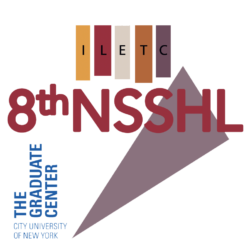To watch the presentation, enter password nsshl2021 below:
5 Replies to “Disrupting Discourses of Capable Illiterate Bilingual Latinx Students through Curricular Analysis (Erica Saldívar García)”
Comments are closed.


8th National Symposium on Spanish as a Heritage Language
Thursday, May 13th–Saturday, May 15th, 2021
To watch the presentation, enter password nsshl2021 below:
Comments are closed.
I do not have a question, but I just wanted to thank you for doing this important work. These discourses of a “capable illiterate” in the field of SHL need more attention, which is made possible through presentations like yours. Thanks again!
Thank you so much, Erica! While listening to your presentation I was thinking that something we tend not to discuss at the college level (at least in the contexts I am familiar with) is what is our “situated” definition of proficiency and literacy when developing curriculum. Are these the types of practices you have in mind when you mention the need to adopt specific practices when going through curricular review processes? I am also curious to know what you think of “interventionist” practices advocated by genre-based pedagogy (Martin, 2000 I believe), but I might write to you about this for a synchronous conversation at some point.
Thank you, Erica for your valuable analysis!
I am very interested in your notion of “interrogating the curriculum” as a discourse structure. Although I agree that curriculum development should include students and emergent teachers as it is as socially constructed process, I cannot forget that I am inscribed in power structures, as a Spanish adjunct, that do not allow me the same amount of participation as, for example, a full-time professor in the institution would have. Of course, I have found ways to navigate these power structures (I invite you to watch my video: Exploring curricular innovations…” in the conference), but I am wondering if you have any thoughts about how to make the curriculum development process a more democratic practice where emergent teachers (most of them in non-tenure track positions) and students fully participate?
Great work! Others had recommended that I see this because of how I’ve been thinking of things lately. I’m entirely tired of the textbook industrial complex, which is a hyperbolic descriptor but, at the same time, it is ingrained in teachers that one needs a book. Yet the majority of books for SHL students contain ideologies that run counter to our own vision. Do you have thoughts on how to move forward?
Gracias Erica por tu excelente presentación. Ojalá podamos conectar porque mi interés también es el currículum. No se si todavía haya tiempo, pero te invito a que veas nuestra presentación “De eso se trata.” Felicidades!